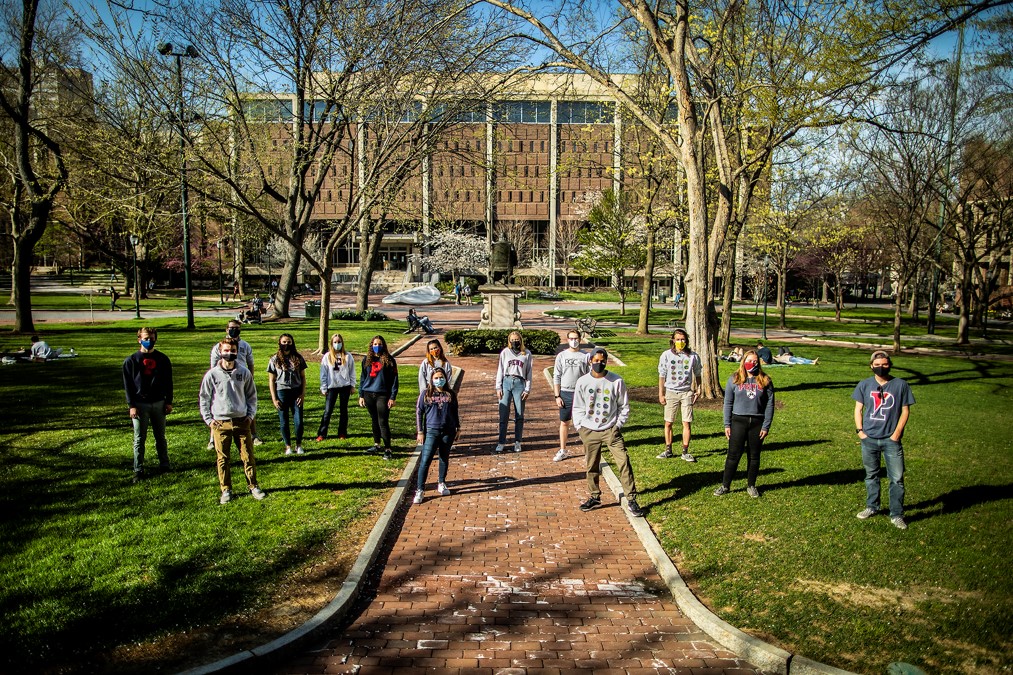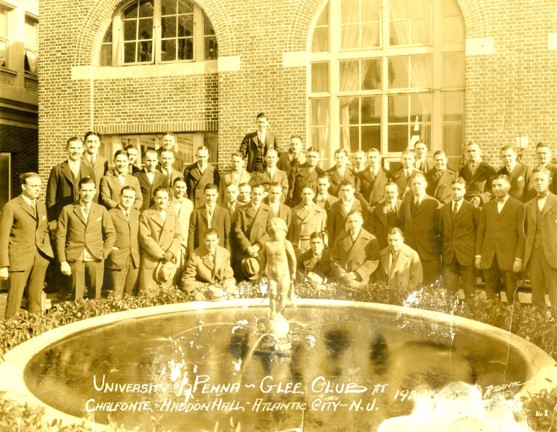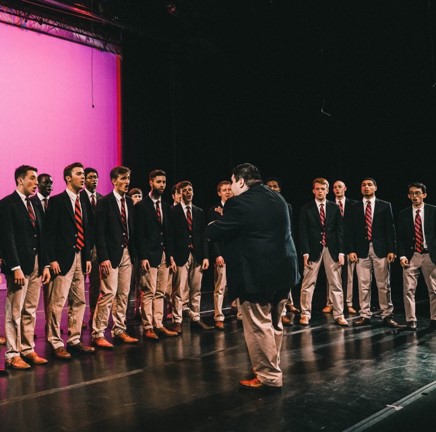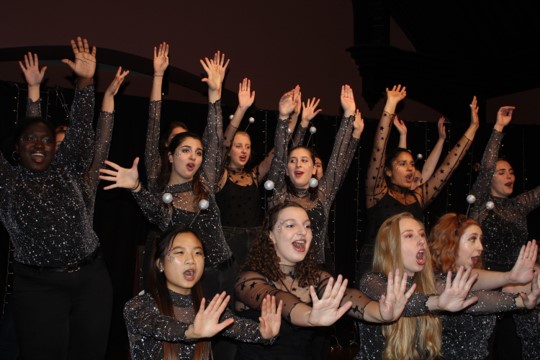Penn Glee Club Merges with Penn Sirens After 159 Years of All-Male Singers

The University of Pennsylvania Glee Club and the Penn Sirens have decided to merge their choral groups, meaning that for the first time since its founding 159 years ago, the Glee Club will include singers of all genders and will perform repertoire for soprano and alto voices, in addition to tenor and bass, and for all four voice parts.
In the final step in a yearslong process to make the Glee Club fully gender-inclusive, currently active members voted unanimously April 9 afternoon to approve an amendment to the club’s constitution and by-laws to allow singers of all genders and all voice parts.
“It’s a milestone day for sure; we are all really excited. It’s quite the accomplishment for all of us. It’s incredible that it’s done. It’s one for the history books,” said senior Jake Milner, Glee Club president, minutes after the vote.
“We talked a lot about the fact that we bill ourselves as the unofficial musical ambassadors of the University, and it’s tough to be an ambassador for the University if a significant portion of the student body is not eligible to be in the chorus,” said Mr. Milner, a finance and accounting major in the Wharton School from Chicago. “It feels like we accomplished something real, something that is good for the future of the Glee Club and its members, but also good for Sirens and its members, good for the performing arts, and good for Penn.”
The Sirens, founded in 2011 as a female vocal ensemble, supported the proposal that opens membership in the Glee Club’s Singers section to students of all genders.
“This merger will provide amazing performance opportunities to all Penn students and creates a more inclusive performing arts community,” said junior Marina Dauer, Penn Sirens president.
“The plan that we have created allows current Sirens members to have representation on the Glee Club’s board and leadership positions while preserving Sirens as a soprano-alto subgroup to make sure we are able to continue our traditions,” said Ms. Dauer, a political science and environmental studies major in the College of Arts and Sciences from Dallas. “The core goal is to be the best performance group possible and put on meaningful shows, and that requires recruiting the people who are the most talented and committed and should include people of all genders.”
The Glee Club was founded on November 5, 1862, during the Civil War and when the student body was all male, by eight undergraduate students in the classes of 1864 and 1865 as a “furthering of musical talents,” according to the University Archives. The Glee Club was the first performing arts group at the University, and by the close of the 19th century had become a regular fixture at ceremonies, events, and sporting games, performing traditional Penn songs such as “The Red and Blue,” “Hail! Pennsylvania,” and “Fight On, Pennsylvania.”

Those traditions continue to this day. Many events featuring the Glee Club are led by Penn’s president and leadership, from Convocation at the start of the school year to Commencement at the end. The Glee Club is one of the groups that touches every student’s life on campus.
“The Penn Glee Club and Penn Sirens—two student groups near and dear to my heart who often perform at our most coveted celebrations on campus—have decided to merge, singing a most beautiful song of their commitment to gender inclusivity,” said President Amy Gutmann. “This change is historic, as the all-male choir component of Penn Glee Club is almost 160 years old. Both groups have exhibited enormous care, with the thoughtful direction of advisors and leaders at Penn, during the process of making this transformative shift, and I am proud to see where they’ve landed.”
The Glee Club’s decision to become fully gender-inclusive is in line with student performing arts at Penn and other universities as fewer students choose to try out for single-gender groups.
“This is a discussion that we are seeing across student groups about equity and access and social justice,” said Laurie McCall, director of Penn’s Platt Student Performing Arts House and advisor to the nearly 50 undergraduate performing arts groups that make up the student Performing Arts Council. “Students across campus are embracing a movement where gender is not a requirement for membership, and gender is not considered to be binary.”
The Performing Arts Council approved the proposed change to the Glee Club’s mission statement on March 29, which opened the way for the Club to change its constitution and bylaws on Friday.
In early April, the club voted in a new Board of Governors for the next academic year, which will include two appointed soprano-alto representatives. The new board will become active on June 1. Recruitment for the Glee Club in the fall semester will be open to the entire student body. Board elections a year from now, for 2022-2023, will be open to all group members.
“We members of the Glee Club feel like there is no justification for excluding people on the basis of their gender anymore,” said Mr. Milner. “We don’t want to turn talented musicians away on the basis of their gender. That just seems like the wrong thing to do. We know the history we have gives us a certain amount of privilege within the community, and we want to use that in a positive way to open up more opportunities for everybody.”
The first performance as a merged chorus will be a recording for the Baccalaureate service on May 16, to be included in a virtual presentation as part of Penn’s 265th Commencement. The combined group will sing the Glee Club’s anthem, “Afterglow,” in a new arrangement with all four voice parts.
In addition to the full chorus, the Glee Club will include two separate chamber choirs: one that sings soprano and alto repertoire and the other repertoire for tenor and bass voices. Additionally, there will be two student-run a cappella subgroups within the Glee Club: the existing Penn Pipers with tenor and bass parts and the Penn Sirens with soprano and alto parts.
The Glee Club Singers section is the final component of the Glee Club to become gender-inclusive. According to senior and Club Historian Benjamin Banker, the first woman to become a member of the group in 1992 was piano accompanist Sharon Hudson. A woman became a technical crew member in 1993, and women were members of the band when it officially became a section of the club in 2009.
Choral singing has not been as popular in recent years, in comparison with a cappella, and both groups were attracting fewer singers to auditions, Ms. McCall said. The Glee Club Singers section has less than half the members it had just a few years ago, Mr. Milner said.
The number of active members in the Glee Club before the merger was 32, but only 14 are singers, a fraction of the 40 typically in the group in the past. Other members include 12 in tech, five in the band, and one accompanist. Penn Sirens has 17 members, all singers. Together they expect to create a Glee Club Singers group of about 30 before auditions and hope to have 40-45 singers as a result of recruitment in the fall.
The pandemic was one of the many catalysts that led to the April 9 vote. All performing arts groups were forced by the pandemic to make changes, from rehearsing to performing to trying to maintain a sense of community while apart. Every interaction was through computer screens.
“It was all new, and it was all different, and any pretense of ‘this is the way it has always been’ went out the window,” Mr. Milner said. “I think that mindset of having to reimagine every single thing that we do, top to bottom, definitely permeated the ethos of the club over the year. Doing things differently gave us an opportunity to think about the future and think about how we can make this a better experience.”
When asked by the students for guidance, Ms. McCall provided directives on possible steps to take in the process, including discussions with current members, discussions with alumni, and consultation with the Penn Women’s Center, the LGBT Center, and other campus leadership.
“The effort was entirely student-driven. There was no mandate from the Platt House or the University,” Ms. McCall said. “With good will and in good faith, the Glee Club met with the Sirens to develop a partnership to explore scenarios. They understood the impact of this decision. And they worked in a way that would be most equitable.”
The Glee Club surveyed alumni, receiving feedback from 148 former members, ranging from the class of 1955 to the class of 2020. An analysis of the survey and comments did not show a definitive consensus.
“Even those alumni who disagree with the decision have acknowledged how crucial it is that the Penn Glee Club be the right group for its current members, serving their wants and needs above all,” Glee Club director Daniel Carsello said. “As an alum of the Glee Club myself, I believe it is the students’ group once we leave, and then alumni take on a legacy role as the living history of the Club.”
 Alumni in the survey expressed concern about losing the tenor-bass repertoire and sound that had made the Club unique but also acknowledged a need to evolve to promote greater diversity, equity, and inclusion, and to include more music.
Alumni in the survey expressed concern about losing the tenor-bass repertoire and sound that had made the Club unique but also acknowledged a need to evolve to promote greater diversity, equity, and inclusion, and to include more music.
Sonja Breda, who graduated from the College of Arts and Sciences in 2016, was a member of both groups, an alto in Sirens and a member of the Glee Club Tech Staff, on the board as secretary-librarian and alumni liaison.
“I remember at different moments in my college career wishing that the opportunities afforded to Glee Club singers were afforded to people of all genders. I wasn’t alone, and I’m proud of the advocacy that was born out of that shared vision for a more inclusive Glee Club,” Ms. Breda said. “While I’m proud of the strides we made during my time at Penn, I must admit, it is bittersweet to see these changes realized after I graduated. I always wanted to be a singing member of the Glee Club.”
The Glee Club performs frequently during the school year and performs two big campus shows, in the spring and the fall. In addition to the major University events, dozens of smaller events feature the group, as well as some high-profile opportunities, like performances at the White House, a Phillies baseball game, and television appearances. In addition, the group goes on extensive annual tours, alternating between domestic and international destinations.
“It’s been moving to see my former classmates who opposed this idea during my time at Penn come around to this initiative and support current students in advancing more equitable and inclusive practices than the ones we knew when we were at Penn,” Ms. Breda said. “It feels right to represent Penn’s diversity on the stage.”
The Penn Sirens revived a tradition of women’s choral singing that dates back more than 100 years. A Women’s Glee Club with soprano and alto voices was founded in 1917 and often performed at events with the Men’s Glee Club, including at the Academy of Music. But in 1957, the women’s group became the Penn Syngers, known today as the Penn Singers, a gender-inclusive light opera troupe.
“I remember seeing the Glee Club perform during my Convocation and thinking ‘Oh, I wish that was for me,’ because I have been singing my whole life. I absolutely love it,” said Ms. Dauer. “In an ensemble known for musical excellence and serving as an ambassador for the University, it is critical for everyone to see themselves reflected.”

Student performing arts groups at universities across the country, including in the Ivy League, are moving to become gender inclusive. Harvard University’s Hasty Pudding musical theater troupe, founded in 1770, and Yale University’s Whiffenpoofs a cappella group, founded in 1909, decided to open to all genders in 2018. At Penn, the Bloomers comedy troupe no longer identifies as all-female, instead accepting “all minority genders.”
“Looking around the campus and the performing arts community, there are a lot of moves happening to be more inclusive and to create a more equitable environment, and the Glee Club wanted to be a part of that,” Mr. Milner said.
The new perspective gained during the pandemic, and the time to focus on the process, was especially important for the seniors who have lost so much of the traditional Penn experience, Mr. Milner said. They worked consistently over the past year to move gender inclusivity forward in the club, not expecting to actually accomplish it before they graduated, he said.
“I think it was motivating to see how we could come out of this very difficult time for everybody stronger on the other side and bring us to this gender-inclusive reality that everybody has been wanting for years,” said Mr. Milner. “When I think about being stewards of a 159-year-old organization, that’s pretty amazing.”
Adapted from a Penn Today article by Louisa Shepard, April 9, 2021.
